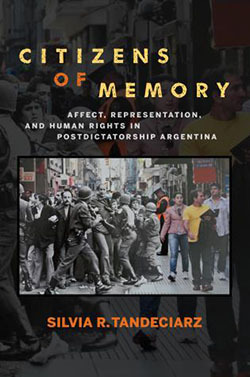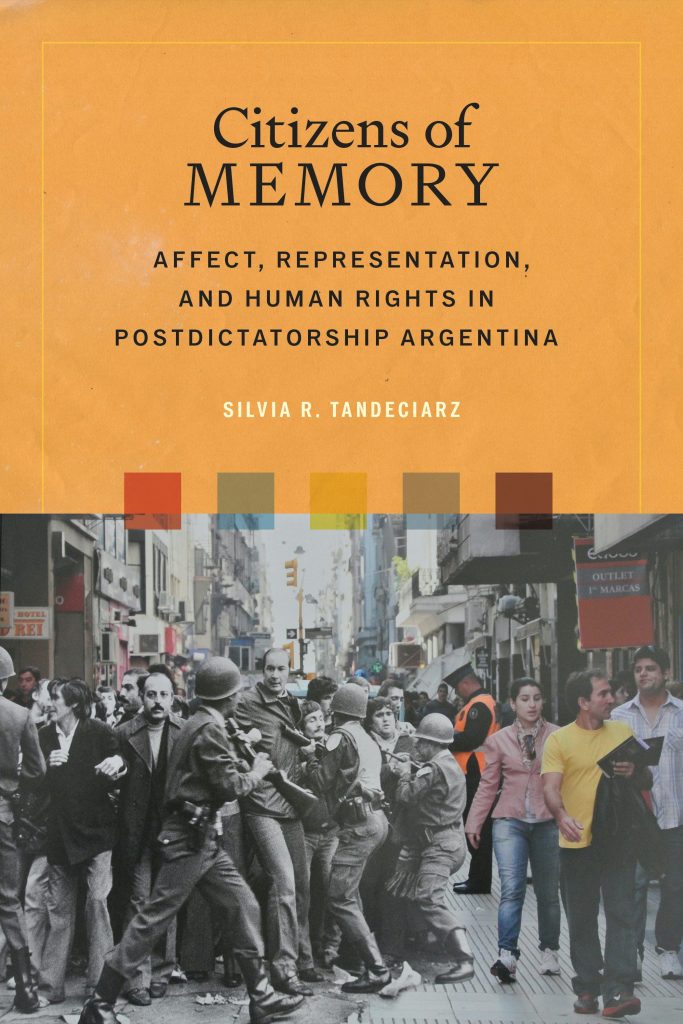As we anticipate next month’s paperback release of Citizens of Memory—first published in the Bucknell Studies in Latin American Literature and Theory series in 2017—Bucknell University Press revisits a book whose message feels more timely and relevant than ever. Written in the wake of Argentina’s struggles for truth and justice, the work now speaks powerfully to the challenges facing democracies across the globe. Here, author Silvia Tandeciarz reflects on the shifting terrain of human rights, the fragility of democratic norms, and what it means to remain a “citizen of memory” in an age of disinformation and forgetting.
When I finished the manuscript of Citizens of Memory in 2016, Argentina’s recently elected president had clearly distanced himself from the transitional and restorative justice initiatives that had so marked the post-dictatorship landscape since the 2002 crisis. Nevertheless, I felt optimistic: debates regarding state repression seemed to have settled on a broadly shared narrative, sites of recollection created, and education programs implemented so that the younger generations would grow in awareness and not “in the land of I don’t remember” (Maria Elena Walsh’s nursery song that brought the Oscar winning film, The Official Story, to a close in 1985). In fact, the next few years sustained this optimism, largely due to tangible advances in memory work and justice that government-to-government declassification diplomacy and other efforts made possible. Human rights organizations might have lost privileged access to the president, but their activism continued to bear fruit.
The scene today feels much more precarious, both in Argentina and here, in our own United States. And not only because of the electric chainsaws and disinformation operations politicians north and south of the border are wielding to reshape the national compact. Authoritarianism is once again on the rise as populist leaders systematically ignore, weaken, or challenge longstanding political conventions, wreak havoc on institutions designed to safeguard democracy and human rights, and pursue ideological warfare against all forms of dissidence and independent thought. The thin veil of checks and balances in which we trusted has been lifted. And with it, the shared stories we told ourselves for so long. In their stead, we find ourselves confronting doublespeak and euphemisms, twisted logic, political manipulation, corruption, grotesque inequality, and criminal deployments of state power.
“Being a citizen of memory today means deploying civic lessons from a past that returns in new guises.”
– Silvia R. Tandeciarz
Given the current state of affairs, I find myself repeating two consistent mantras. The first is that this is not what we meant when we proclaimed never again after the horrors of our last century. The second, that studying the dystopian world of state repression that inspired Margaret Atwood’s The Handmaid’s Tale holds lessons for navigating the present. Being a citizen of memory today means deploying civic lessons from a past that returns in new guises. It means deploying that DNA of strategic resistance when we witness the detention of our neighbors, the displacement of our homeless, the gerrymandering of our voting districts. It means revisiting successful PR campaigns that brought down tyrants to conjure up our own; refusing to censor ourselves, just to stay off the radar; challenging the deployment of federal security forces on our streets; and voting out those elected representatives who abdicate their responsibility to act as checks on power. As Timothy Snyder’s treatise, On Tyranny: Twenty Lessons from the Twentieth Century, so eloquently puts it: let’s not teach power what it can do by surrendering in advance.
The world today is a much darker place than the one that ushered in the first edition of Citizens. And for this very reason, a place that needs even more the memories of the possible I tried to capture in its pages. My deepest thanks to Suzanne Guiod and the whole Bucknell University Press team for making space for this work so that new generations of citizens of memory might continue to find ways to advocate on behalf of a more perfect union, one forged in the active and ongoing defense of human rights.
*The opinions expressed in this content are solely my own and do not reflect the policies or positions of William & Mary.
Silvia R. Tandeciarz is Chancellor Professor of modern languages and literatures and vice dean for social sciences and interdisciplinary studies at the College of William and Mary.

The paperback edition of Citizens of Memory: Affect, Representation, and Human Rights in Postdictatorship Argentina is available for order here.

